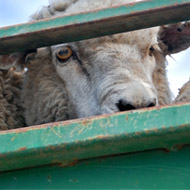RSPCA 'should have access to ports'

The report recommends that the health and welfare of animals, including when in transport, be considered paramount.
The RSPCA should be granted access to ports to inspect shipments of live animals, according to a report by Dover District Council.
There have long been protests against the export of live farm animals, particularly in Dover, where lorries are often seen travelling through the town.
A campaign to improve welfare has been gathering support and becoming more high profile, especially since the Ramsgate tragedy in September 2012, where over 40 sheep were killed.
Now, Dover District Council has voted to take steps that could improve the lives of thousands of farm animals transported through Kent's ports every year.
The report from Dover District Council's Scrutiny Committee - a committee made up of non-executive councillors - invites written and oral evidence from key stakeholders, including Dover Harbour Board, Kent Trading Standards, the NFU and the RSPCA.
In the council document, published on 4 March, the following recommendations were made:
• That the health and welfare of animals, including when in transport, be considered paramount.
• That the Council write to the Secretary of State for Transport and the Secretary of State for Environment, Food and Rural Areas to urge an amendment to the Harbour, Docks and Piers Clause Act 1847 for the purpose of giving ports discretion in respect of accepting the transport of live animals for the purpose of slaughter.
• That the Council urge the responsible European and British authorities to better enforce existing regulations relating to the transport of live animals.
• That the Council express its support for inspectors from the RSPCA being granted access, with agreement and under the supervision of Animal and Plant Health Agency (APHA), at all ports involving the export of live animals.
Welcoming the report, Lenny Rolles, RSPCA's senior parliamentary adviser said: "Dover is the industry’s preferred port, therefore these recommendations could result in greater protection for thousands of animals such as sheep and calves if this trade continues.
"The RSPCA wants to see an end to the live exports of farm animals for slaughter, however, until that day, we must push for better enforcement of the regulations, an issue the council would like to support going forward.
"We would be delighted to provide assistance to the council and to Dover Harbour Board in implementing the recommendations and we hope the government listens to and acts upon the concerns that this report has raised.



 The Veterinary Medicines Directorate (VMD) is inviting applications from veterinary students to attend a one-week extramural studies (EMS) placement in July 2026.
The Veterinary Medicines Directorate (VMD) is inviting applications from veterinary students to attend a one-week extramural studies (EMS) placement in July 2026.